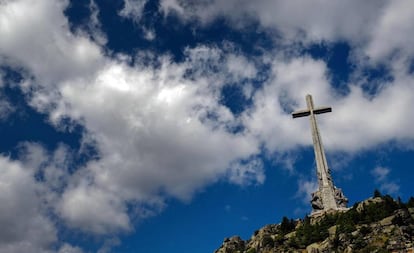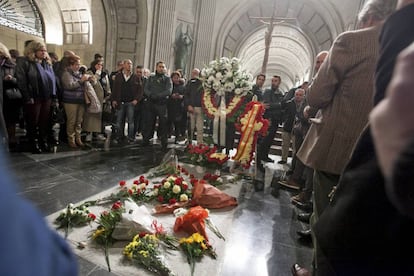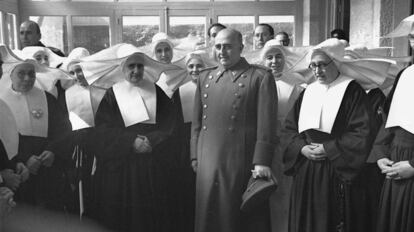Spain’s Supreme Court suspends the planned exhumation of Franco
The Socialist Party government of Pedro Sánchez has been working on a project to move the remains of the former dictator since last June, but has met the stiff opposition of his family


Forty-three years after his burial, and with just six days left to go until his planned exhumation, a Spanish court has temporarily halted the transfer of the remains of former Spanish dictator Francisco Franco from his resting place in the Valley of the Fallen monument to El Pardo cemetery, where his wife was laid to rest. Five magistrates from the Supreme Court have “unanimously” ruled today in favor of the Franco family to freeze the operation, on which the Socialist Party (PSOE) government of Pedro Sánchez has been working practically since it came to power in June 2018.
The process to transfer the dictator from the Valley of the Fallen has been a lot more complicated than the government expected
EL PAÍS broke the news of the planned exhumation nearly a year ago, but the process to transfer the dictator from the Valley of the Fallen – a monument located around 58 kilometers northwest of Madrid city center, and constructed to celebrate Franco’s nationalist forces’ victory in the Civil War (1936-39) – has been a lot more complicated than the government expected.
Franco’s closest living relatives, his grandchildren, as well as the National Francisco Franco Foundation, have placed all kinds of obstacles in the way of Sánchez’s plan to exhume the former dictator’s remains and turn the Valley of the Fallen into a “place of memory and reconciliation.” Among these maneuvers were demands for military honors for a new burial and for Franco to be laid to rest in La Almudena cathedral, a place of worship located in one of Madrid’s most touristic areas.

The Franco family opted for La Almudena – where the dictator’s daughter is buried – when invited to choose a new resting place, a move the PSOE government had not expected. In response, one of Sánchez’s ministers sought support from the Catholic Church to block the move. In the end, the Spanish government cited “clear risks for citizen safety and mobility” as their reason to veto the cathedral as the new burial site. The Valley of the Fallen continues to be what Franco wanted it to be: a grand monument to immortalize his victory in the Civil War. But moving his remains to La Almudena could have established a site for the glorification of Francoism right in the touristic heart of the Spanish capital.
The appeal filed by the seven grandchildren of the dictator called for the Supreme Court to freeze the exhumation until it reaches a final decision on the merits of the case. They argued that the transfer of the remains would have caused “irreparable” damage should it have been carried out. According to the Francos’ arguments: “No family should be forced to go through two exhumations and three burials of one of its loved ones until all of the possible legal channels via which their legitimate rights can be availed have been explored.”
The appeal filed by the seven grandchildren of the dictator called for the Supreme Court to freeze the exhumation
The Association for the Recovery of Historical Memory, a group that works to collect testimonies of the victims of Francoism and excavates mass graves from the war and subsequent dictatorship, on Monday filed a complaint with Spain’s legal watchdog. They claim that one of the Supreme Court magistrates on the case, José Luis Requero, is not impartial for having expressed his opposition in the past to the concept of historical memory. He is also friends with the lawyer Santiago Milans del Bosch, who has collaborated with the Franco Foundation.
Members of a protest group called Ni Valle ni Almudena (or, Neither the Valley nor the Almudena) will be staging a demonstration today outside the Supreme Court. “Every day that Franco spends in [the Valley of the Fallen] is an insult to Spanish society and democracy,” they argue.

Pedro Sánchez’s administration – which, in the wake of the inconclusive April 28 elections, is an acting government – has promised to respect the decision made by the Supreme Court, but is not going to stop trying to see its plan through. “Achieving the final objective is more important than the route we have to take,” said on Monday the acting deputy prime minister, Carmen Calvo.
“This precautionary suspension means that the government will postpone the exhumation until a decision is reached in the coming months regarding the merits of the case. The government is convinced that the Supreme Court will throw out this appeal, just like it has done so far with all the appeals lodged by the Franco family,” said the executive in a release.
A proposal to exhume the remains of Franco and turn the Valley of the Fallen into a place of memory has been approved twice in Spain’s lower house of parliament, the Congress. In 2017 the plan was approved with 198 votes in favor and 140 abstentions, and in 2018 by 172 votes in favor, 164 abstentions (by the conservative Popular Party (PP) and center-right Ciudadanos (Citizens), and with two votes against (apparently cast by PP deputies who meant to abstain).
Buried under a 1.5-ton gravestone, and with fresh flowers placed on his burial site every day, Franco is resisting in the Valley of the Fallen, which was ostensibly built to commemorate all of the victims on both sides of Spain’s bitter and bloody domestic conflict. The remains of more than 33,800 victims of the war lie there, making it the largest mass grave in Europe. Just two of the grave sites located there are marked: that of Franco, and José Antonio Primo de Rivera, the founder of the Falange, Spain’s fascist-inspired political party.
Ironically, Franco himself did not want to be buried at the Valley of the Fallen, given that he was a victor and not a victim of the Civil War. Victims from the Republican side of the conflict have been unable to reclaim the remains of their loved ones because of the poor condition of the site. Water leaks have ruined the crypts containing the remains, meaning the bones of the victims are mixed up.
English version by Simon Hunter.
Tu suscripción se está usando en otro dispositivo
¿Quieres añadir otro usuario a tu suscripción?
Si continúas leyendo en este dispositivo, no se podrá leer en el otro.
FlechaTu suscripción se está usando en otro dispositivo y solo puedes acceder a EL PAÍS desde un dispositivo a la vez.
Si quieres compartir tu cuenta, cambia tu suscripción a la modalidad Premium, así podrás añadir otro usuario. Cada uno accederá con su propia cuenta de email, lo que os permitirá personalizar vuestra experiencia en EL PAÍS.
¿Tienes una suscripción de empresa? Accede aquí para contratar más cuentas.
En el caso de no saber quién está usando tu cuenta, te recomendamos cambiar tu contraseña aquí.
Si decides continuar compartiendo tu cuenta, este mensaje se mostrará en tu dispositivo y en el de la otra persona que está usando tu cuenta de forma indefinida, afectando a tu experiencia de lectura. Puedes consultar aquí los términos y condiciones de la suscripción digital.








































